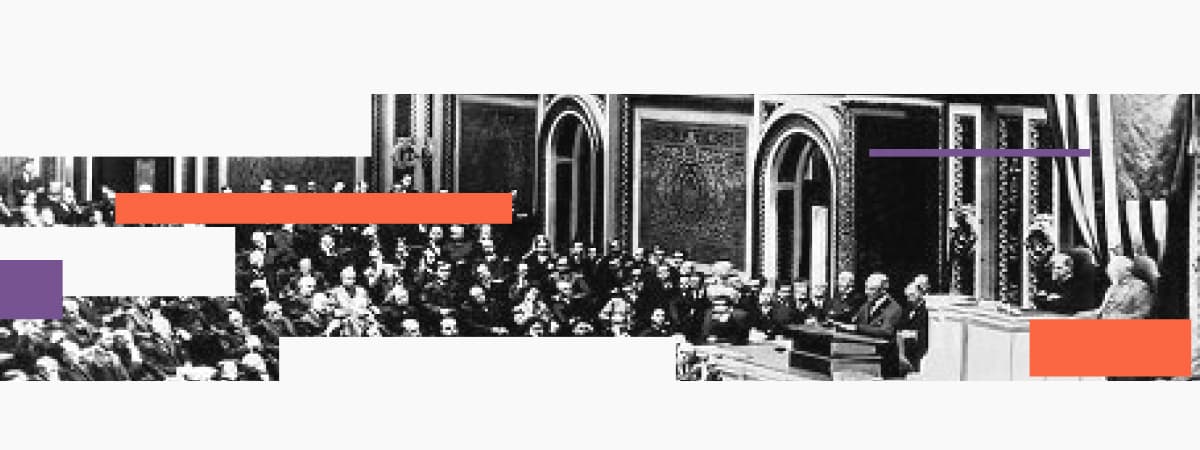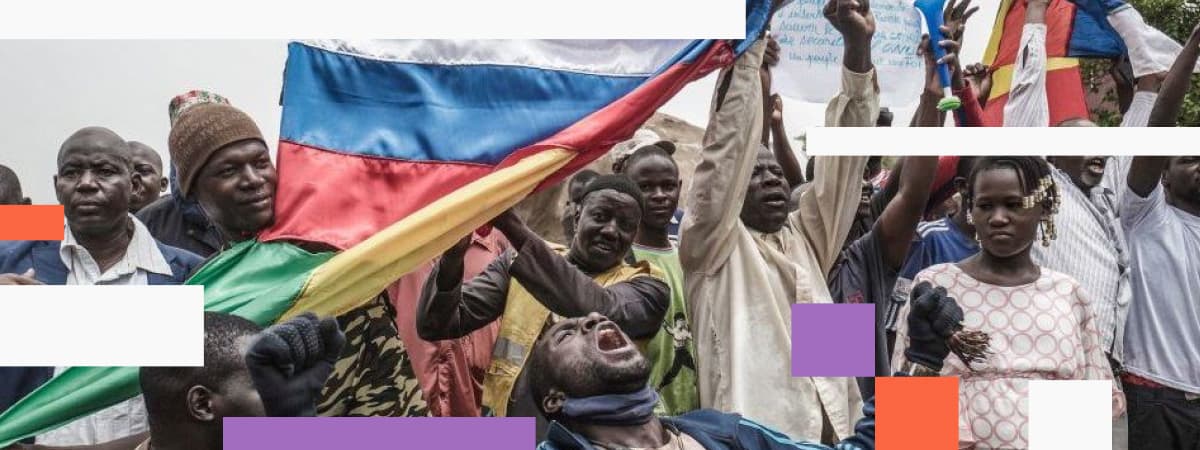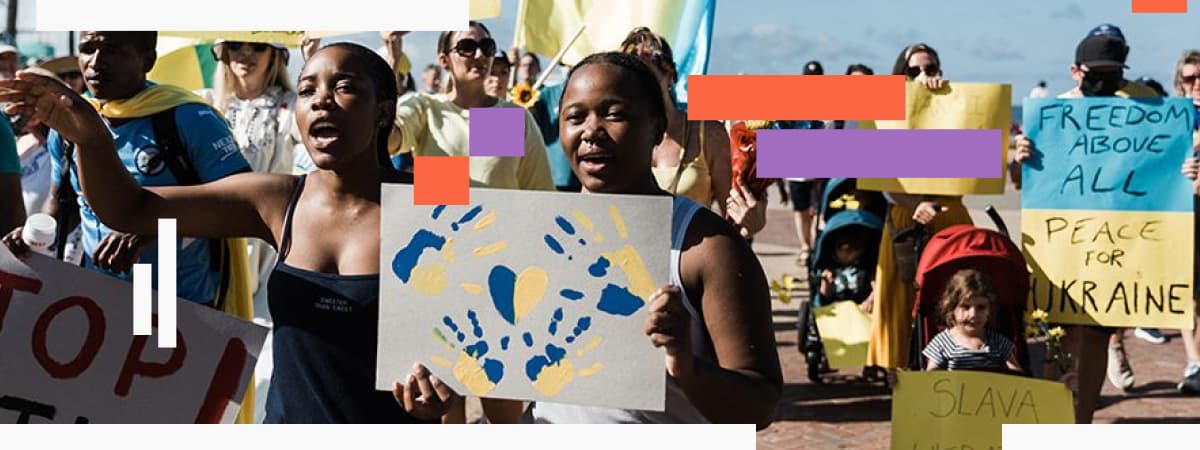Russian Propaganda in Africa: Background and Consequences

According to a survey by the Gallup Institute for Public Opinion Research, in 2021, most of the population of at least seven West African and Central African countries had a positive attitude towards the Russian leadership. In 2014, 24 African countries abstained, and two voted against the first UN General Assembly resolution on the Russian-Ukrainian war.
It mentions Russia only once, and even then, only in the title of the friendship treaty between Ukraine and Russia. The resolution calls for the pseudo-referendum in Qirim to be considered invalid. It was enough for a significant part of the African continent (53%) not to support it. These figures are one of the reasons why in 2020, Ukraine declared the African region as one of the priorities for economic diplomacy in its National Security Strategy.
However, these indicators cannot be accidental. They result from long-term trends in relations between Western and African countries and Moscow. Over the past 70 years, the struggle in this triangle has been taking place simultaneously on many levels, including the information level. The current successes of Russian propaganda in some African countries are directly related to the past.
It is necessary to understand this context to develop effective ways of cooperation with African countries, particularly in public or citizen diplomacy.

Background
The First World War led to changes on the political map and in the world of ideas. In January 1918, US President Woodrow Wilson proposed a plan to reform international relations after the war. This speech went down in history as Wilson's Fourteen Points. Among them, one point concerned the colonies. The US president's proposal nowadays seems too obvious to be put forward at all. Still, it was revolutionary at the time — to consider not only the demands of empires but also the interests of the colonised population.
This principle later migrated to the Covenant of the League of Nations, the first international organisation aimed at resolving conflicts without weapons. Paragraph 22 of the Covenant states that the principle of "the welfare and development of their populations" should be applied to colonies. To ensure the principle’s implementation, the same paragraph provided for the creation of a special instrument to oversee some colonies — a system of mandates and a permanent commission. Six mandate territories were established in Africa.
The first chairman of the commissions was the Swiss William Rappard. He called the system "the beginning of a significant and correct revolution in the administration of the colonies". At the same time, Rappard did not hide that this system resulted from a compromise between the European empires, which demanded that the mandate territories be transferred to the winners of the war, and the United States, which sought to create a completely independent international administration. However, the US refusal to participate in European politics led to the gradual destruction of this system.
As Susan Pedersen, a researcher of the mandate system, writes, during the 1930s, it suffered ideological blows. On the one hand, communist Moscow led the international anti-imperialist movement, which aimed at abolishing the mandate system and rapid decolonisation.
On the other hand, in 1935, fascist Rome invaded independent Ethiopia, motivating its actions like the League of Nations did with its colonies: we want to take care of “underdeveloped people, to bring them civilisation”. It compromised a system that was trying to balance between extremes and demonstrate that it was different from previous colonisers.
One of these ideologies was defeated in the Second World War, while the other gained strength. European countries were forced to give up their colonies one after another. The historian of the British Empire, William David McIntyre, identifies three levels of factors that led to its collapse: financial crises at home, the inability to play the role of a great power on a par with the USSR and the United States, and the nationalist mobilisation of colonised societies.
France, Portugal, Belgium, Spain, and the Netherlands all faced similar situations, although the speed of their aggravation depended on the political and economic systems in place in the metropolis. In the end, during the sixties and seventies, a significant number of African colonies became states, although decolonisation processes will continue for a long time.
The nationalism of the colonised often develops based on socialist ideology. But how does it reach the colony, thousands of kilometres away from its European sources? It is due to the ties between the metropolis and the colony, which is not only true in Africa. The elites of colonised societies travel to the metropolis to pursue higher education, whereby they gain access to Marxist ideas at universities and bring them back home.
It was the case, for example, with the classic of postcolonial studies Frantz Fanon, but also with one of the most bloody dictators, Pol Pot, who studied in Paris and then ruled Cambodia from 1975 to 1982.

Scene One: Soviet Propaganda
In other words, even before the establishment of independent African states, these societies already had people capable of spreading communist ideas. Their influence accelerated with the collapse of empires. This period falls on the reign of Nikita Khrushchev. Active investments in providing Soviet education to people from Africa began.
For example, in 1960, the USSR established the Peoples' Friendship University, named after the assassinated Congolese politician Patrice Lumumba two years later. In addition to their major, students were taught Communist Studies. Over the next 30 years, tens of thousands of Africans would graduate from the university. The United States also educated future African leaders. However, the difference was that, according to the Open Doors study, as of 1981, the United States funded only 2% of international students. There was no such issue in the USSR- most students studied for money from the Soviet budget.
Under such circumstances, for the rest of their lives, people remain grateful to the Soviet regime, which helped them get out of poverty and into leadership positions. The Lumumba University played a role not only in the long term but also in current information operations: while still studying at the institution, foreigners were already translating Russian propaganda.
In Soviet terminology, such activities were called "intelligence from one's territory". However, Soviet propagandists also operated on foreign territories, particularly in Africa. They used radio, a relatively cheap way to reach an audience that could not read.
In the sixties, the propaganda station Radio Moscow began broadcasting in 11 African languages. If, in 1958, the station's African service broadcast 1.5 hours a day, by 1963, the figure had risen to 18.
As for the quality of content, a typical Radio Moscow programme contained more material about Soviet than African news. When Africa was discussed, events were presented only from the point of view of politicians loyal to the Kremlin. Whereas broadcasters in the US, Nigeria, Canada, Saudi Arabia or Israel began their African programmes with the most important political events on the continent, Radio Moscow's priority was the launch of a Soviet satellite into space. It was also important to tell Africans that the USSR had sent books to Czechoslovakia.
Speaking of books, in 1976, the Soviet Union sent a plane to Angola with brochures containing speeches by then-Secretary General Leonid Brezhnev. The embassy reported that the brochures had been distributed. However, there were also difficulties — Soviet diplomats did not know what to do with the multi-volume Lenin's works they had received. The problem was not that no one in Angola had read the Soviet leader-the centre had sent the books in French, even though the country was a Portuguese colony.
No matter how clumsy Soviet propaganda was, its impact should not be underestimated. It was effective not because of its content but because of its prerequisites. Moscow did not have African colonies, so Russian imperial racism was hidden. To be effective, Soviet propaganda needed only to emphasise US racism and colonialism of the country that was the metropolis in a particular region. By painting a negative picture, the Kremlin presented itself as the lesser of two evils.
Scene Two: Russian Propaganda
The late Soviet era was marked by economic hardship that transformed many people's worldviews in the Soviet Empire. In the western borderlands of the USSR, national-democratic movements grew stronger. At the same time, to the east, these movements lead to ethnic violence: in Karabakh between Armenians and Azərilər (Azerbaijanis); in the Ferghana Valley between Oʻzbek (Uzbeks) and Ahıska Türkleri (Meskhetian Turks). It is becoming clear that all Soviet attempts to promote an identity that was "ethnic in form, socialist in content" did not create a "Soviet people".
Similar processes are taking place with race. Ghanaian researcher Charles Quist-Adade points out that Soviet "internationalism" was poorly concealed paternalism — an attitude towards Africans as less developed people who needed to be set on the right path. As Soviet propaganda at home began to lose funding and legitimacy, paternalism transformed into racism.
In 1988-1992, Quist-Adade worked on his dissertation in Leningrad (Saint Petersburg), so he surveyed local students. According to him, in 1991, most respondents had a better attitude towards white South Africans than blacks. Over the previous 30 years, the USSR had spent a lot of resources supporting the armed movements of black South Africans.
The collapse of the Soviet Union created negative prerequisites for Russian propaganda: The Kremlin was too busy dealing with issues at home and aggressing against neighbouring countries that sought to rid themselves of Russian influence. For the next 10-15 years, Africa was purely a business for Russia: many African armies and industries depended on Russian goods and components.
For example, according to the Stockholm International Peace Research Institute, between 1991 and 2014, Russia supplied arms to 28 African countries. At the same time, the real value of the arms supplied was only 11% of the total value of all Russian arms exports. In other words, African countries depended more on Russia than Russia needed to trade with them.
The situation changed after 2009. The Russian invasion of Georgia (Sakartvelo) in 2008 demonstrated that the Kremlin was losing in the information sphere and could not control the agenda. After that, Russia began to invest more heavily in the Russia Today network, which broadcasts to foreign audiences. The network launches an Arabic-language service, which allows it to direct propaganda to North Africa. However, Russian propaganda began to target the continent intensively only after the outbreak of the Russian-Ukrainian war.
That's when what Western analysts and scholars call "Russia's return to Africa" took place. The Kremlin, convinced it did not belong in Europe, expanded its influence in the Global South. In 2014, the aggressive Sputnik propaganda resource was launched to counteract negative information about Russia abroad.
In 2017, Russia Today launched a French-language advertising campaign and, within a few months, increased its audience in French-speaking African countries. A real information confrontation unfolds. In 2018, Seth Jones, a researcher at the Centre for Strategic and International Studies, called this trend the return of "political warfare" from the twentieth century.
A French Ministry of Defence research centre began to study Russian propaganda in Africa. In 9 months, researchers have identified 622 unique websites that disseminated content created by Russian propaganda. Facebook played an important role, allowing for the rapid dissemination of conspiracy theories with clickbait headlines.
In addition, the researchers found many Facebook pages dedicated to praising Putin as a strong man. Propaganda also serves Russian commercial interests: for example, in the autumn of 2020, the Russian Sputnik V vaccine was promoted as the most effective in Mozambique, Nigeria, and South Africa.
However, all Russian operations are based on the same idea: to portray France (or any other European country) as a coloniser sucking resources from Africa and to show that only Russian help can save it. Since the audiences in question are hostile to the French, they are receptive to such statements and begin to trust Russian-affiliated sources. The paradox is that Russian propaganda uses "migrants from Africa" as a horror story for Europe and "colonisers from Europe" as a horror story for Africa.

Scene three: Prigozhin propaganda
Russia Today and Sputnik cannot hide their ties to the Russian state. In the case of French-language propaganda, these resources are registered as legal entities in France. Their accounts indicate they are 100% owned by the Kremlin. This limits the range of activities.
As Yevgeny Prigozhin demonstrated on June 24, 2023, he has no limits. He is a petty thief who, thanks to his persistence and connections, was able to get into the Russian elite, so he sees no obstacles on his way to power. The emergence of the private military company Wagner and other Prigozhin structures in Africa significantly strengthened Russia's position.
For a long time, Prigozhin pretended that he had nothing to do with the PMC and that the PMC was an autonomous organisation. However, during his coup, the owner of the Wagner PMC admitted that he had operated in Africa following instructions from the Russian leadership.
Prigozhin's structures introduced new elements into Russian propaganda:
- Botofarms. The use of algorithms allows for the automated dissemination of propaganda messages. In addition, funding a person's education at Lumumba University is no longer necessary to make them loyal to the Kremlin. It's enough to create a fake account and spread the desired messages.
At the beginning of the full-scale invasion, Prigozhin's structure likely created thousands of Twitter accounts. Fully automated bots ran some of them, while others were run by real people who rented out their accounts to spread the desired messages. To an outside observer, it looked as if Africans were extremely active in supporting Russia. But linguistic analysis proves that their actions were coordinated. The peak of activity coincided with a meeting of the UN General Assembly, during which member states approved a resolution demanding the withdrawal of Russian troops from Ukraine. The intention was to "interrupt" the news and turn the audience of Ukraine and its allies against the Africans.
- Hacking. Another alternative to Lumumba University. You can hack a real person's account and start spreading pro-Russian messages on their behalf. If this is done simultaneously for many accounts, it may seem society has a consensus to support the Russians. This is probably what Prigozhin's structures did with the accounts from Nigeria.
- Hybridisation. Russia Today and Sputnik may spread certain messages but always remain in the virtual world. The presence of armed militants allows Prigozhin's structures to go further. For example, they can send political technologists to countries that are to be influenced.
In 2018, the Prigozhin delegation supported eight candidates in the Madagascar presidential election. In addition, they can also transfer propaganda to the physical world by printing newspapers or putting up posters. Prigozhin and the Russian embassy have funded a radio station spreading Russian propaganda in the Central African Republic since 2018.
- Experimental formats. While classical propaganda is limited in genres, hybrid structures do not have this problem. Prigozhin's organisations create cartoons about a Russian bear or a Wagnerian paratrooper coming to the aid of Africans in the fight against the French rats, zombies or France the Serpent. This allows expanding the audience of propaganda to people who cannot read.
Ways to Counteract
In the confrontation with Russia, Ukraine almost constantly faces an asymmetric situation. We have to be smart and build coalitions. The same applies to the issues of information confrontation in Africa: Ukraine will never be able to overtake Russia in terms of spending in this area. Instead, several nuances should be considered in diplomacy, including civil diplomacy.
1) Colonialism and racism are not an invention of Soviet propaganda. Africans have legitimate reasons to distrust Western media. Therefore, the advice to "read the BBC" will not help.
2) African states are independent and sovereign. They can cooperate with whomever they wish. Ukraine's task is to demonstrate the negative consequences of cooperation with Russia, particularly in the information sphere: the destruction of democratic debate in society, radicalisation and suppression of minorities.
3) Everyone can believe in propaganda. Until recently, a network of Medvedchuk's TV channels in Ukraine spread fables about biolabs, external control by secret elites, and the "self-execution" of the Revolution of Dignity. On the eve of its closure in 2021, the network gained 3% of the national audience.
4) Negative messages tend to be more popular than positive ones. Many people from Africa may not be interested in how cool the culture in Ukraine is. At the same time, some issues directly affect them if there is an armed conflict in their country. These are war crimes committed by Wagnerians in Mali, the Central African Republic and other African countries. They often do not receive enough attention because they are smaller in number than Russia's crimes against Ukraine. However, drawing additional attention to these facts will allow Ukraine to potentially gain a more favourable audience.


